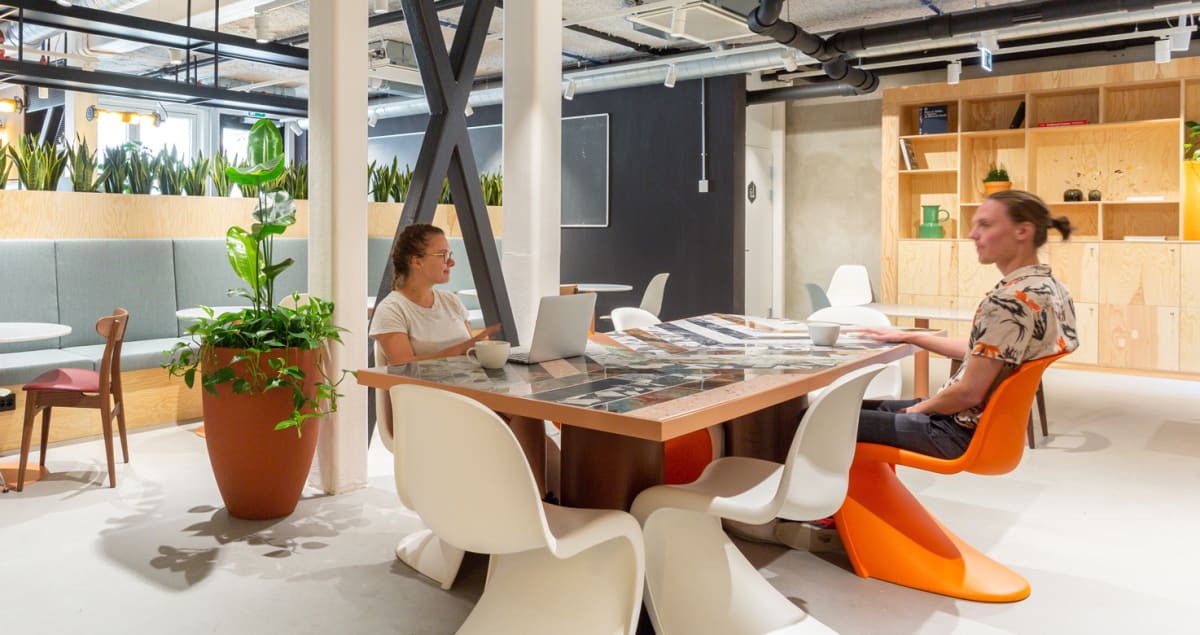As companies realise they no longer need old-fashioned, sprawling office spaces, a network of flexible workspaces that complement a central HQ can give the best of both worlds.
One of the silver linings of the pandemic is that companies are discovering new ways of working that reduce inefficiencies such as long daily commutes, expensive offices at prestigious addresses, and large amounts of space with unoccupied desks.
That isn’t to say that a physical HQ is no longer needed but rather, as the hybrid working model continues gaining traction across the globe, businesses are seeing the benefits of re-evaluating their workspace strategies to better suit the way their teams are actually functioning.
The rise of hybrid working
A hybrid working model means employees can divide their working hours between a local flexible office space, the company’s headquarters, and working from home.
Hybrid working answers the call of employees – 85% of whom want to work in a hybrid manner from now on rather than returning to the office full time, according to the UK’s Office of National Statistics.
It also creates an opportunity for a more streamlined, sustainable and bespoke approach to corporate real estate – one that makes much better business sense than simply doing what’s been done before.
Essentially, it’s about redistributing company office space away from a single, centralised headquarters and making use of flexible workspace closer to where their employees actually live.
This may mean downsizing the former HQ with a capacity for the entire team, and instead pursuing solutions that allow a business to increase or decrease the amount of space it is using in line with its changing needs.
Unlike traditional office leases – where fixed, lengthy terms are common – flexible workspace gives companies the freedom to increase or decrease their workspace portfolio as required, which makes sense at a time where companies are responding to their employees’ requests to work from anywhere.
A sustainable solution
As clients are identifying strategies for operating more sustainably, there are several ways a hybrid office model supports this – starting with its impact on commuting culture. Research from IWG and professional services consultancy Arup found that a typical worker in the UK needs to commute for 58 minutes to reach a city-centre HQ (in the US it’s 55 minutes).
By removing the need for the entire team to commute every single day through hybrid working, a business drastically cuts down the collective carbon footprint of its employees.
Secondly, by only using the amount of workspace it actually needs, a company avoids wasting light, heating, water and other resources, which translates into significant cost savings, too.
Improve mental wellbeing
Similarly, a hybrid model of working is designed to create a working environment that’s more sustainable for employees’ wellbeing.
As companies are fervently seeking ways to reduce burnout among their teams and improve people’s mental health, hybrid working is a compelling option.
It empowers team members to work from home when they need to, or access modern high-quality flexible workspace in their neighbourhood when they want more social interaction or a better boundary between work and home.
As flexible office space continues to open up in new locations outside of city centres, businesses can offer employees an attractive workspace within their local shopping centre, their high street or moments from their favourite social spots, supporting a better work-life balance than a daily commute to a city centre.
“In the near future, we believe that there will be a professional workspace available everywhere – from the largest city to the smallest village,” says IWG Founder and CEO Mark Dixon.
“This transformation will unlock unprecedented value for workers, businesses and local economies, while providing an important contribution to improving the environment. With people working locally, local amenities and retail outlets will receive a boost and new jobs will be created to service a national network of workspaces.”
IWG has been helping brokers design sustainable corporate flexspace solutions for the last 30 years. Find out how we can support you today.






